Sleep Tips for Athletes

Athletes work hard to win, from training hard to what they eat, but most athletes overlook one pertinent factor- sleep.
In addition to physical conditioning and eating right, sleep plays a significant role in athletic performance and results. Quality sleep is often the solution to winning because sleep provides energy to the body and brain. If an athlete is deprived of sleep, their body will need more time to repair and recover from this deprivation.
How Much Sleep Does An Athlete Need?
Most experts advise athletes to aim for a minimum of 8 hours sleep every night. And this should be included in their schedule, so that even on weekends or periods when they are not competing, they’ll still need to keep to a sleep schedule of at least 8 hours per night.
Also, sleeping should be carried out in a controlled environment with minimal noise and the right blackout curtains. To avoid injury at night, complete blackout curtains are not encouraged. The room should be kept sufficiently dark, but not too dark that the athlete could trip and fall if they wake up in the middle of the night. The room should also be uncluttered, and at a temperature between 64 and 68oF for optimal sleep.
To reduce noise, all electronics should be removed, and display lights from tablets, laptops, mobile phones, and TVs should be taken away as they could hinder the production of melatonin- this is the chemical that controls our sleep and wake cycles.
Beds and personal comfort are important for a good night’s rest. Most NFL camps have started to bring in comfortable mattresses to the training camps. This new move has helped players recover faster after training. Even the Olympics training rooms were recently equipped with full-size plush-top mattresses with box springs and extra pillows; out went the twin beds.
To create a sleep schedule and develop better sleeping habits, use the below tips as a guide:
- Take a brief nap of 20-30 minutes before each game. This type of nap can double your alertness.
- If you suffer from any sleeping disorders like snoring or insomnia, get help from a sleep center because until these issues are addressed your performance will be less than your best.
- If you cannot sufficiently block out the light, or if you can only sleep in pitch darkness, then use an eyeshade to block out the light.
- Some people cannot sleep with the smallest of noises, as an athlete you do not want these little annoyances keeping you awake, so get earplugs and block all sounds.
- Sometimes your body might want sleep, but your mind may still be awake with a lot of thoughts and information swirling around your head and keeping you awake. Simply get it all down on a notepad. Write down your thoughts or things to do, whatever it is that could be keeping you awake.
- Some sleep experts recommend light breathing exercises, yoga or even a warm shower at bedtime. This is just like warm milk for kids and will help put you to sleep.
- Don’t forget the time zone. Whatever your schedule, always take the time zone into consideration so you don’t miss out on valuable sleep time.
- Be careful of antihistamines that may contain ingredients that interfere with sleep. Stay clear of all OTC (over-the-counter medications) and weight loss medications.
Watch what you eat and drink before bedtime! Some people believe that drinking before bedtime is a great way to get a good night’s rest. Alcohol is not a sleep aid. Alcohol will help you fall asleep faster and even sleep deeply for a while. But the truth is that it reduces rapid eye movement (REM) sleep. It will make sleep fragmented and destroy all benefits of your workout from the days before.
